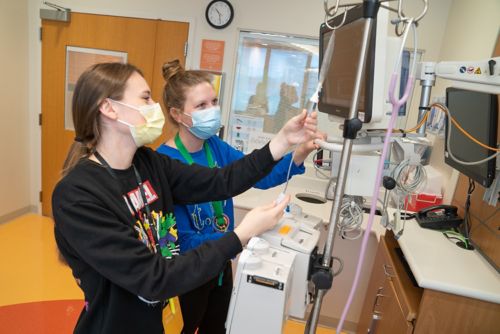Restful Sleep in the Pediatric ICU: Healing and Recovery

The ICU can be a scary place that makes it hard to get restful sleep.
As a pediatric sleep psychologist, I see how hard it is for children in the Intensive Care Unit (ICU) to get the restful sleep they need. In these units, children get constant care for serious conditions, but the environment can be noisy and dark. Machines monitor vital signs, alarms beep, and staff are always moving. Medical checks that wake patients up can leave them sleepy and make it hard to go back to sleep.
The ICU can also be a scary place. Parents are stressed and exhausted. A lack of routine can also make everything feel confusing.
But restful sleep is an important part of healing and recovery. Restful sleep is good sleep in which someone can fall asleep easily and stay asleep without significant interruption. When someone gets restful sleep, they wake up feeling refreshed.
Despite its many challenges, there are ways to help children get restful sleep in the ICU.
The ICU and its impact on sleep
Our bodies have clock genes in the cells of each organ. These clock genes regulate our body's hormone and organ processes such that they should be active or resting in line with a human circadian rhythm. When an organ does not work as well as it could or should, it affects the whole body.
There are also a lot of risk factors in the ICU for delirium. Delirium is a serious, temporary condition that makes it hard to think clearly, stay focused, and be aware of one’s surroundings. It often causes confusion, concentration problems, and behavior changes.
Delirium can happen suddenly. It can be caused by many things, such as illness, infection, medicines, or changes in the environment. Sedation medicines and the illness itself put children at risk. Delirium can also be caused by losing the distinction between day and night.
Both children and adults who develop delirium can have longer-term challenges, longer ICU stays, more disease symptoms following discharge, and other problems. But there are things we can do to help prevent delirium. An important way to prevent delirium is to have a healthy sleep schedule.
"In the pediatric ICU, both children and their caregivers face many challenges, especially when it comes to sleep. While the environment can be difficult, restful sleep is crucial for healing and recovery."
How to help your child sleep in the ICU
Unexpected things can happen in the ICU all day and all night. You should never feel pressure to do things perfectly. There are ways that you can help regulate your child’s sleep and activity in the ICU.
During the day
It can be easy for children in the ICU to get disoriented. Using natural light is one of the best ways to help prevent this.
As the sun comes up, begin to open the blinds. Turn on the TV or play music. Talk in a normal, conversational tone. Let your child know what day and time it is. Talk with them about what their day will look like. You might tell them, "Today is Thursday. It is 9:30 in the morning. We are going to do your bath in a little bit."
Let them know, "This is daytime. This is active time."
All of these things will help your child recognize that it is daytime, and it is time to be awake.
In the evening
Having something that resembles a bedtime, even though a child is in the ICU, can show the child it is time to go to sleep. Begin to close the blinds, dim any lights that are on, and let them know where they are in their routine. You might say things such as:
- “Now it is dinner time.”
- “Now we are going to read a story.”
- “Now we are going to listen to some music.”
How to care for yourself in the ICU

Talk with your child’s nurse to see how they can help you get restful sleep.
It is challenging to sleep when your child is critically ill. At the same time, you cannot pour from an empty cup. You need to take care of yourself so that you can take care of your child.
Try to leave the unit for a little while every day. Walk to the cafeteria or get a glass of water. Walk a lap or 2 around the unit so you are getting some physical activity. Try to eat food with good nutritional value.
Parents need restful sleep, too. Try to sleep when your child goes to sleep. And let your child’s care team help. When they can, nurses will stop people from coming in and bothering you. They will let you know if your child needs something while you get some sleep.
Small efforts can make a big difference
In the pediatric ICU, both children and their caregivers face many challenges, especially when it comes to sleep. While the environment can be difficult, restful sleep is crucial for healing and recovery. By creating a calm, comforting space and working closely with medical staff, you can help your child rest. Remember, even small efforts to improve sleep can make a big difference in supporting your child’s health and well-being in the ICU.





